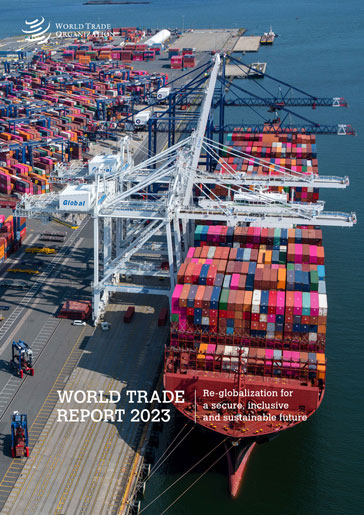The event attracts over 2,000 representatives each year from civil society, academia, business, government, international organisations and the media.
Extracts of the programme
12/09 Conversations on Trade, Global Economy and Climate Nexus
12/09 Launch of the World Trade Report 2023.
The WTO’s flagship publication offers deep insights into the latest developments in the world of international trade. This year's report focuses on re-globalizing for a resilient, inclusive and sustainable future; critical themes at the heart of today's global trade landscape.
WTO (2023) The World Trade Report 202 # 134 p.
The World Trade Report 2023 presents a comprehensive analysis that informs policymakers, industry leaders, and stakeholders alike. It offers a wealth of data-driven insights that will shape discussions and decisions on trade policy and strategy.
- The report examines the relationship between economic integration and three major
- challenges facing today's global economic order: security and resilience, poverty and inclusiveness, and environmental sustainability — areas in which arguments have gained ground that globalization has not delivered as expected or exposes countries to excessive risks.
- Looking at the evidence, the report makes the case that “re-globalization,” which is the renewed drive towards integrating more people, economies and pressing issues into world trade, is a more promising solution to these issues than fragmentation. The report shows that trade openness is strongly linked with a reduced likelihood of conflict and has led to sharp declines in poverty for over four decades. Also, technology improvements enabled by trade have had a strong impact in reducing carbon emissions.
- Finally, the report emphasizes the need for more trade and more cooperation to effectively address the major issues that policymakers are facing the world over — from security to inclusiveness to climate change. A re-invigorated and reformed WTO can play a central role in tackling these challenges.
The report can be downloaded here. Printed copies are available through the WTO Online Bookshop.
An executive summary of the report is available here.
An executive summary of the report is available here.
Opinion: Stephen Karingi, Melaku Desta and Jason McCormack, “Re-globalization around green trade –
challenges and opportunities for Africa” . page 107:
"Africa should welcome re-globalization based on green trade. But a re-globalization that does not put development and justice at its core will likely face the same fate as today’s version of globalization. Unfortunately, the introduction by major trading powers of unilateral measures in the name of fighting climate change risks stifling Africa’s industrialization prospects under a re-globalization anchored around green trade."
- Moderator: Collins NwosuTrade Ambassador, International Trade Facilitation Association
- Deotun Abbi-Olaniyan (see picture) Founder/CEO, Thistleberry Food Company Limited
- Priscilla Akpason-Nwosu Co-founder, Member Board of Trustees, Shea Integrated Global Foundation (SIGF)
- Titilope OjoFounder, (see picture) Agrochains Consult Services
- Olusola Sowemimo Founder, Lead Strategist, Ope Farms
13/09 Impact of agriculture on climate and solutions
The session will allow a panel of guests and speakers to discuss the opportunities offered by climate change for a reorganization of cultivation methods by adopting more ecological, more digital methods through the use of automated delivery systems. This will make it possible to better manage supplies and agricultural production, fight against food waste, and preserve land for sustainable development.
- Regis Paterne Odjigo Chef projets, Ompouyi la ferme biologique
- Raphael Ampeme Administrateur directeur général, Ompouyi la ferme biologique
- Christiane Marabyla fondatrice, ONG EDEN LIFE
13/09 The Green Trade Debate - Forging Trade for a Sustainable Future
This panel explored how we can accelerate climate action with value chains, while promoting globally minded policies that support local and international initiatives. From nationally determined contributions to market-based solutions, this panel will tackle the big questions and uncover practical solutions for a more sustainable future.Investment for expansion of trade in environmental goods and services, the implementation of sustainability standards, and the greening of global value chains can increase the share of sustainable trade, and have the potential to significantly influence world trade patterns.
- Moderator Gbemisola Osadua Lead Consultant and Ph.D Researcher (Sustainable Africa Trade),Dynamics Impact Ltd
- Bankole Allibay Chief Executive Officer, Translantic Development Limited (TDL)
- Ludmila Azo (see picture) Country Manager, International Trade Centre (ITC)
- Chidi Oguamanam Professor of Sustainable Bio-Innovation, Indigenous Knowledge Systems and Global Knowledge Governance, University of Ottawa
- Alain Traore Ambassador (Project Manager) , Ministry of Foreign Affairs, Burkina Faso
- Moderator Aissatou Diallo Chief of the Office for Africa, International Trade Centre (ITC)
- Jayasurya Kalakkal (see picture) Expert, Environment and Trade, UN Environment Programme (UNEP)
- H.E Prof. Muhammadou M.O. Kah Ambassador to Switzerland and Permanent Representative to UNOG at Geneva, WTO and Other International Organizations in Switzerland, The Gambia
- Peter Nyeko Co-founder and CEO, Mandulis Energy
- Colette van der Ven Founder and Director, TULIP Consulting
14/09 EU and African Perspectives on the Green Transition webcast
- Moderator Alice Tipping Director Trade and Sustainable Development, International Institute for Sustainable Development (IISD)
- Dr. Caiphas Chekwoti Head of Centre, Trade Policy Training Centre in Africa (TRAPCA) Cleopa
- Dr Kilonzo Mailu Ambassador, Permanent Representative, Permanent Mission of Kenya to the UN and other IOs
- Maria Martin-Prat (see picture) Deputy Director-General, European Commission - DG Trade
15/09 Smallholder insertion and sustainability in supply chains



No comments:
Post a Comment